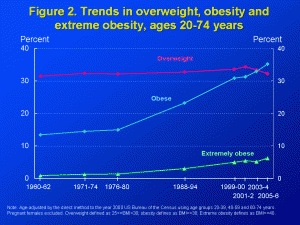Dr. Paul Marantz of the Albert Einstein College of Medicine, New York has taken a closer look at the current obesity epidemic. He and his coauthors are observing that Americans have listened to the recommendations to reduce their fat intake. This recommendation which first made its appearance in 1980 pointed out the risk of a high fat diet and its connection to cardiovascular disease. Even though there is enough evidence that a modification of fat intake could reduce cholesterol, the government guidelines against fat have not managed to improve cardiovascular disease outcome. The authors of the publication noted that Americans have slightly reduced their fat intake, but their carbohydrate and total calorie intake have actually increased. The consequence is logical: higher calorie intake is contributing to the rise in obesity and the increase in adult onset diabetes. Dr. Marantz drew on records from the Centers for Disease Control and Prevention to arrive at these results. From 1971 to 2001 fat intake has decreased by 9% in women and 5% in men, but carbohydrate intake went up by 6% in women and 7% in men. Total daily caloric intake went up by 335 calories in women and by 168 calories in men. Both genders showed an increase in obesity. While 55% of men and 41% of women were overweight or obese in 1971, by 2001 the rate had risen to 70% in men and 62% in women. The reasons for this are very likely due to many factors. Aggressive marketing of low-fat foods may have given the public the impression, that these foods can be consumed without consequences.
Another reason likely is that fat in the diet can induce satiety and stop us from eating excess calories. It has not helped to label fat in the diet as an enemy instead of pointing out that small amounts of heart healthy fats in the daily diet are an important part of our nutritional team players and allies in the quest to good health. Key to successful dieting is to consume a low fat diet, rich in unrefined, low glycemic carbohedrates. Caloric intake has to be restricted for successful weight loss.
More information about:
Refined carbs: http://nethealthbook.com/health-nutrition-and-fitness/nutrition/carbohydrates/
Metabolic syndrome: http://nethealthbook.com/hormones/metabolic-syndrome/
Reference: American Journal of Preventative Medicine, Feb. 8, 2008
Last edited November 3, 2014






